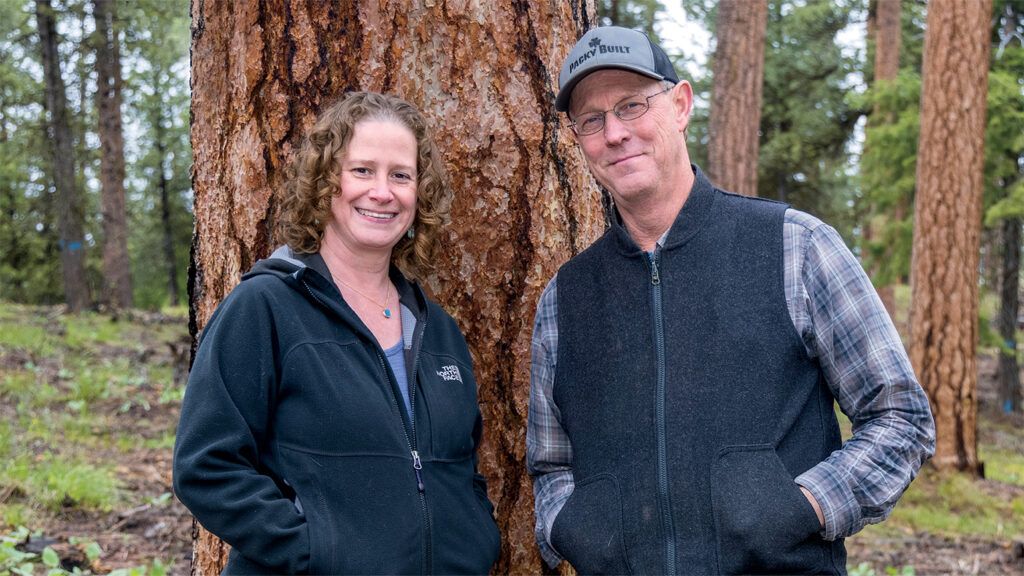Whenever I need to feel close to God, I head to the mountains.
Jesus went to the wilderness to pray, and so do I. Even if it’s just a little state park an hour from where I live in Manhattan, the outdoors is where I feel God draw near. I hear his voice in the soft silence. I catch a glimpse of something larger, more powerful, truer than anything I experience in my daily routine.
My wife, Kate, feels the same way. We’ve raised our kids with an appreciation for God’s presence in nature. We took them on their first backpacking trip before they started elementary school.
This year, with the kids now 11 and 14, we plan to hike a good portion of the 211-mile John Muir Trail in California’s rugged Sierra Nevada. Kate is a pastor, and we both hope this will be as much of a spiritual journey as a physical one.
I believe the opening chapters of Scripture are clear about our responsibility to take care of God’s creation. I grieve for the damage that people have done to the land. I also grieve that attempts to repair the damage have divided us. I worry about the world our children will inherit.
When Guideposts began planning a series of stories about people bridging their differences and finding common ground, there was one story I prayed I would find. Was anyone reaching out and working with their opponents to find solutions to our environmental challenges? Could people of faith play a constructive role? I grew increasingly skeptical.
One day last fall, I came across a public broadcasting story about loggers and environmentalists in Oregon collaborating to save a forest and a sawmill. The story was titled “A Way Forward.” That sounded promising.
I called one of the people involved, a former county administrator named Mark Webb, who now leads Blue Mountains Forest Partners, a nonprofit organization that facilitates cooperation between environmentalists and the timber industry.
One of the first things Webb said was “Faith has characterized my approach here. I’m a Christian.” He has worked as a forester but also has a graduate degree in philosophy from the University of Notre Dame, where he studied Christian thinkers.
“To my mind, this is an interesting story about working with people who disagree with me, which is pretty critical for our world and our nation,” Webb says. “People of faith can take some lessons from it.”
Here at last was the story I’d been looking for.
Blue Mountains Forest Partners is in Grant County, Oregon, a 4,529-square-mile expanse of forested mountains, farms, cattle ranches and high desert. There are 7,199 people and exactly one stoplight in the entire county.
Grant County was once a timber-harvesting powerhouse. Then recessions in the 1980s and 1990s lowered the demand for wood. Foreign competition muscled out American loggers. Mechanization wiped out mill jobs.
In 1994, federal lawmakers adopted the Northwest Forest Plan, which cut back on logging in the Pacific Northwest to protect endangered species. Fire suppression and clear-cutting in old-growth forests had decimated animal habitat and led to dense, blaze-prone regrowth.
Battered logging companies consolidated, laid off employees and went out of business. Once-thriving communities lost their livelihoods. Parents worried about putting food on the table, let alone affording college for their kids. Families suffered.
The causes of the timber industry decline in America are complex and long-standing. Many people in Grant County seethed, blaming the environmentalists whose regulations and lawsuits shut down logging projects.
A few people, including Mark Webb, decided that anger wasn’t going to solve any problems. A new approach would be required.
In 2003, then county commissioner Boyd Britton traveled to Portland with a small delegation to speak with one of the environmental lawyers who kept winning in court: Susan Jane Brown, a respected Oregon litigator. Brown had stopped numerous Grant County logging projects that did not comply with regulations.
Britton went into a courtroom where Brown was arguing a case. During a break, he walked up to her. “I hear you’re the one who’s kicking our butt in court,” he said. “Is there another way to go about doing this?”
A different environmental lawyer might have ignored Britton’s plea. Brown told me she’d grown up in a hunting and churchgoing family. She understood it wasn’t just environmentalists who cared about the land.
Britton invited her to come to Grant County to see the impact of her lawsuits. Brown agreed—though she brought along a friend for protection.
Britton introduced Brown to a local logger who practiced sustainable timber harvesting on his property and used the modest profits to pay for his kids’ college education. Shutting down logging would affect those kids, Brown realized. People were part of the environment.
“I can win a lawsuit, and that’s great, and on the ground maybe that timber doesn’t get logged,” she says. “But the fallout from that has repercussions. What happens to the workers or the mill?” She agreed to meet with local leaders to figure out a different way forward.
Here’s where faith comes in. In 2006, Mark Webb was elected to an administrative position overseeing county government. He is not your typical tree cutter.
Webb grew up in Texas and first came to Oregon to compete in a motocross race as a teenager. “I fell in love with the mountains and the large landscape,” he says. Webb shares my spiritual connection to the land.
He returned to Oregon after graduate school at Notre Dame. He had initially planned to go to seminary and become a pastor but then decided “there needs to be a Christian voice in philosophy.” He became a college philosophy professor but couldn’t set aside his love of the land. He taught part-time and made sure he spent a good part of each year outside, cutting trees or repairing fences.
“I consider myself conservative and religious [and] a hillbilly in terms of the work I like to do,” he says. Studying the history of Christian thought, however, made Webb see that “part of our calling is not just doctrinal purity but also to make the world a better place…. We could be wrong, and we need to consider doing things differently sometimes.”
Webb brought that faith-based humility to his negotiations with environmentalists.
The two sides gathered for a series of meetings at a restaurant in John Day, Grant County’s largest city. Loggers and local leaders, including Webb, were in one room. Environmentalists were in another.
“There was a lot of distrust and animosity,” Webb says. A mediator was brought in because neither side would talk face-to-face.
Eventually, everyone had to eat, and they mingled at the restaurant bar. Webb and Britton ended up at a table with several environmentalists. They got to talking.
“They had kids in soccer or liked to elk-hunt, and I was a soccer coach and liked to elk-hunt,” Webb recalls. “That humanized things. You started to see them as people with different beliefs rather than someone who is out to get you.”
The two sides agreed to invite independent scientists to study how logging affects local forests. The results surprised everyone.
The forests, scientists said, were unhealthy—and both loggers and environmentalists had played a part in that. Decades of clear-cutting and wildfire suppression in pursuit of timber profits had filled the forest with small, dense, fire-prone trees. At the same time, environmental restrictions prevented loggers from thinning out the choked woods. Native species, which depend on more open woodland, were suffering.
The divide wasn’t between cutting trees and saving the forest. It was between the right way and the wrong way to fix generations of forest mismanagement and neglect.
Through many rounds of negotiation, Webb and other local leaders worked out a plan with the environmentalists. Loggers would thin out smaller trees and clear undergrowth, reducing the fire risk and helping bigger, older trees survive.
The remaining problem: So many lumber mills had shut down that there was no place to send the logged wood. Grant County’s last functioning sawmill, Malheur Lumber Co., was on the verge of closing. Without a mill, the plan would fail.
Everyone scrambled. Brown and other environmentalists lobbied state politicians to fast-track their proposal so the mill could process and sell the wood. “Here I was trying to keep a mill open, and I’ve spent my career trying to shut mills down,” Brown says.
“The timber industry as a whole wanted to fight this all the way,” says Bruce Daucsavage, general director of Ochoco Lumber, which owns the Malheur mill. “We said, ‘You don’t have time to fight this.’ We have to do something we’ve never done before and trust each other.”
Nine years later, Malheur Lumber employs 90 workers and processes 25 million board feet of public forestland timber annually. “Our future is quite bright,” Daucsavage says.
Loggers have thinned out hundreds of thousands of acres in surrounding national forests, restoring the woods to a more natural balance. Blue Mountains Forest Partners is working to increase the use of controlled burning—an ancient Native American forest management method—to reduce the risk of catastrophic wildfire.
The spirit of collaboration appears to be spreading. In John Day, leaders are coming together to guide the municipality toward a more economically diverse and sustainable future.
The city is replacing its outdated wastewater treatment plant with a state-of-the-art facility that will recycle up to 80 million gallons of water per year. The water will be used at the lumber mill and in high-tech greenhouses that are slated to grow produce for both local consumption and export. Lumber mill by-products will eventually fuel a biomass generator that supplies electricity to John Day residents.
The goal is to make the city America’s first self-sustaining community. “We were a company town until the 1990s,” says city manager Nick Green. And now? “John Day is like a 100-year-old start-up.”
Mark Webb’s faith continues to guide his efforts. “The lesson of the creation story is land and wildlife stewardship, and something went wrong there,” he says. “There are a lot of lessons in the Jewish Scriptures about giving the land a rest…a sense there of caring for others. That lesson should pervade how we go about it now.”
I will carry those words with me on our family’s mountain expeditions this year. The saga of Grant County has taught me that hope lies in our willingness to reach out to others in humility and good faith to find shared solutions to the many conflicts that divide us.
I will marvel at the majestic peaks and hardy trees of the Sierra Nevada with the renewed belief that if God provided for nature to be a way to commune with him, then he will help us preserve it for ourselves and for our children.
For more inspiring stories, subscribe to Guideposts magazine.





